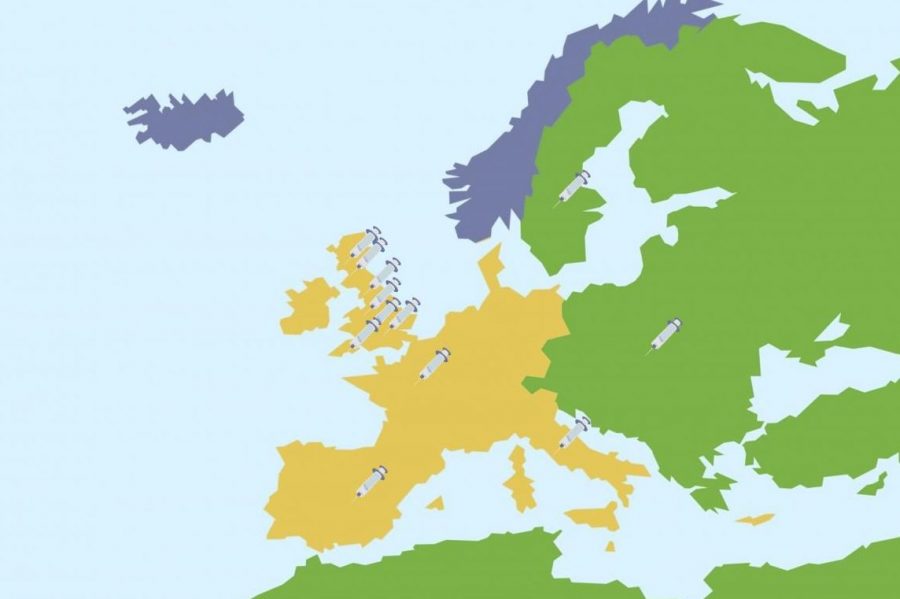Before the pandemic, measures of success for world leaders were key economic performance metrics such as unemployment or contributions to resolving domestic affair issues.
Currently, however, how efficiently a country’s vaccination program has been rolled out may become a critical performance indicator on which politicians are evaluated. Could this ultimately influence re-election?
Since the first COVID-19 vaccine was authorized for use, many may have been hoping for life to return to what it used to be. However, the distribution and rollout of the vaccine is more complicated than it seems. Four months after the first vaccine came out, the virus still dictates certain aspects of daily life.
Different countries have managed the rollout of the COVID-19 vaccine more efficiently and effectively than others. The Financial Times reported that as of April 1, the U.K. had administered 54.3 doses per 100 people, the U.S. 46.4 doses per 100 people and the EU 17 doses per 100 people.
This raises a question: what caused this disparity between the European countries, the U.K. and the U.S.? According to the New York Times, the U.S. has been more successful than Europe in rolling out the COVID-19 vaccine because it involved itself with pharmaceutical companies in the private sector earlier to boost production of the vaccine.
But, what of the U.K. approach? In a London School of Economics blog, Gareth Davies, professor of EU Law at the Vrije Universiteit in Amsterdam, argues the U.K.’s rapid rollout is due to a more selfish approach. He said the U.K.’s goal has been to procure as many vaccines as possible for itself first, while the European community committed to global contribution in spite of potential domestic shortages.
Trustee and Professor of European Politics and Policy at the London School of Economics Chris Anderson said he echoes the New York Times. He said the success of the vaccine distribution in the U.K. has a lot to do with the early-on investment in pharmaceutical companies.
Anderson said the U.S. invested significantly in companies such as Pfizer and Moderna, while the U.K. dedicated investment to private companies such as AstraZeneca.
Anderson also said the NHS is crucial to the U.K.’s approach.
[Click here to listen] “Almost everyone is registered through the NHS, which means you can get to people pretty quickly, pretty easily,” he said.
Anderson said countries without a national healthcare system are not distributing the vaccines quickly enough, citing Germany as an example, since its healthcare system isn’t centralized.
[Click here to listen] “It’s a mix of public and private,” he said. “It’s a federal system so there’s differences across the different regions in the country and so on. There hasn’t been that one central authority driving things.”
Furthermore, Anderson said the U.K.’s vaccine program success is not related to Brexit as EU members didn’t have to go through the union to procure vaccines.
[Click here to listen] “The U.K. being a member of the European Union would have never prevented the U.K. from doing what they did,” he said.
In addition, Anderson said the success of the U.K.’s vaccine rollout program will likely help Prime Minister Boris Johson’s image in the short term.
“Governments that do a good job handling the vaccination program have seen a boost in popularity,” he said. “In Boris Johnson and the Conservative Party’s case in the U.K., they’ve seen a boost in support from the public at large, and of course that can be helpful in winning the next election.”
However, Anderson said he cautions that elections are still quite far away and things may change.
“By the time the next election comes around, I’m not sure we’re going to be talking about vaccinations, we’re probably going to be talking about other issues,” he said.
Nevertheless, Anderson said what is interesting about the U.K.’s situation is that the nation maintained the worst death rate of any western country – a huge failure on the part of the government. Being so successful at the vaccination program, Anderson said, “gives the government a real opportunity to retell the story of the pandemic.”
According to Anderson, the U.K.’s success is ultimately a combination of smart investments in vaccines early on, coupled with an established infrastructure like the NHS, through which it can quickly distribute the vaccines.
Anderson said the success of the vaccine roll out will definitely positively affect the long term recovery of the U.K.
“I think it can be extraordinarily helpful,” he said.
However, he said he would caution that a strong vaccine rollout has to be coupled with sound economic policy.
“There’s an interesting contrast with the U.S. perhaps where the Biden administration is combining rolling out the vaccine but also making very significant investments, public investments, into different parts of the economy right now,” he said.
Ultimately, according to Anderson, an effective vaccination program alone will not be a guarantee of political success; a thriving economy will also be necessary.
This story was originally published on The Standard on April 14, 2021.





























![IN THE SPOTLIGHT: Junior Zalie Mann performs “I Love to Cry at Weddings,” an ensemble piece from the fall musical Sweet Charity, to prospective students during the Fine Arts Showcase on Wednesday, Nov. 8. The showcase is a compilation of performances and demonstrations from each fine arts strand offered at McCallum. This show is put on so that prospective students can see if they are interested in joining an academy or major.
Sweet Charity originally ran the weekends of Sept. 28 and Oct. 8, but made a comeback for the Fine Arts Showcase.
“[Being at the front in the spotlight] is my favorite part of the whole dance, so I was super happy to be on stage performing and smiling at the audience,” Mann said.
Mann performed in both the musical theatre performance and dance excerpt “Ethereal,” a contemporary piece choreographed by the new dance director Terrance Carson, in the showcase. With also being a dance ambassador, Mann got to talk about what MAC dance is, her experience and answer any questions the aspiring arts majors and their parents may have.
Caption by Maya Tackett.](https://bestofsno.com/wp-content/uploads/2024/02/53321803427_47cd17fe70_o-1-1200x800.jpg)
![SPREADING THE JOY: Sophomore Chim Becker poses with sophomores Cozbi Sims and Lou Davidson while manning a table at the Hispanic Heritage treat day during lunch of Sept 28. Becker is a part of the students of color alliance, who put together the activity to raise money for their club.
“It [the stand] was really fun because McCallum has a lot of latino kids,” Becker said. “And I think it was nice that I could share the stuff that I usually just have at home with people who have never tried it before.”
Becker recognizes the importance of celebrating Hispanic heritage at Mac.
“I think its important to celebrate,” Becker said. “Because our culture is awesome and super cool, and everybody should be able to learn about other cultures of the world.”
Caption by JoJo Barnard.](https://bestofsno.com/wp-content/uploads/2024/01/53221601352_4127a81c41_o-1200x675.jpg)






